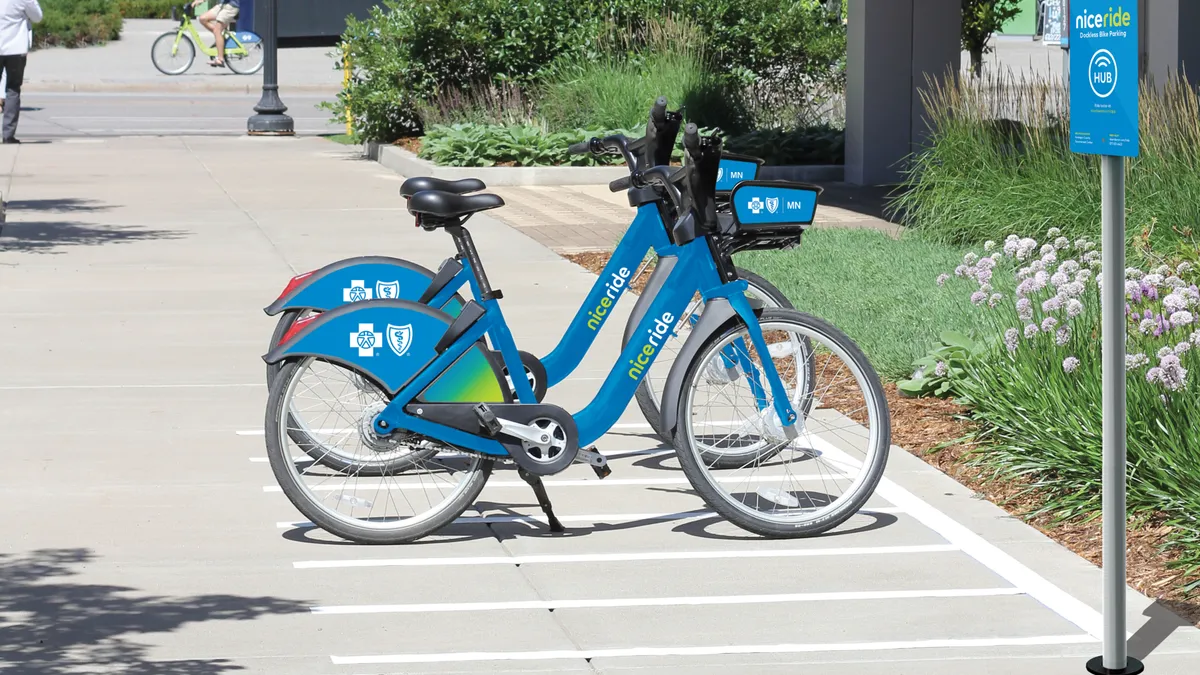Dive Brief:
- Minneapolis' traditional bike-share service, Nice Ride, officially began its transition to a dockless program yesterday, according to an emailed press release. It began releasing dockless bikes throughout the city and expects to have up to 1,500 on the streets this fall with an additional 1,500 coming next year. If all goes well, it will add 1,500 more per year through 2021.
- The bikes will be corralled within virtual "parking hubs" being installed throughout the city, and rides must begin and end at these hubs. Riders can use the upgraded Nice Ride app to locate hubs and unlock bikes. 200 hubs will be installed by the end of the year and more are expected next year.
- Riders can try the new system for free on Friday as part of Car Free Day in Minneapolis. Nice Ride has also lowered its permanent bike-share usage fees.
Dive Insight:
Nice Ride is a nonprofit that works closely with the city on the bike-share program, and the duo has partnered with bike-share operator Motivate — recently purchased by Lyft — which now runs Minneapolis' program. Organizers say the cost of infrastructure and maintenance has hindered the traditional bike-share program's expansion, but the reduced installation and ongoing operating costs from eliminating docking stations will allow for greater and quicker expansion.
The virtual parking hub concept could eliminate some of the stress other cities are going through with figuring out how to alleviate negative impacts from dockless bikes, such as clutter from improper parking. Nice Ride users who park bikes outside of the hubs will be fined, and repeat offenders might be banned. In addition, transitioning the municipally-backed program to dockless prevents the governance difficulties associated with overseeing private dockless companies.
The dockless program launch comes shortly before Minnesota's harsh winter, which will make biking a less pleasant experience. A department of public works employee previously told Smart Cities Dive that Minneapolis does plow its expanding network of traditional and protected bike lanes as part of its Complete Streets policy.
However, Nice Ride only offers services seasonally and takes in the bikes and docking stations during the winter to avoid corrosion and to prevent being an obstacle for snow plows. Adopting the dockless model will make the seasonal turnover much easier because employees will not have to worry about collecting the docking stations in the late fall and re-distributing them in the spring. Part of the program expansion plan eventually is to add winter and electric bikes, the Star Tribune reports.
Although the dockless program is being rolled out throughout the city, underserved areas are being targeted for the first hubs. Equity is one of the main drivers for Minneapolis' transition to dockless. The goal is to make sure transportation deserts and low-income neighborhoods are among the first to get the dockless service.
“Expanding access to multimodal transit options is essential for any city that’s serious about making sure that residents who can’t afford cars can make it to work and mitigating climate change,” Minneapolis Mayor Jacob Frey said in a statement. “Nice Ride’s expansion to neighborhoods in Phillips, Seward, and North Minneapolis also provides a more affordable transit option for communities that have historically been cut off from access to jobs and amenities. With this launch, Minneapolis is showing that it will continue leading on transit equity.”












